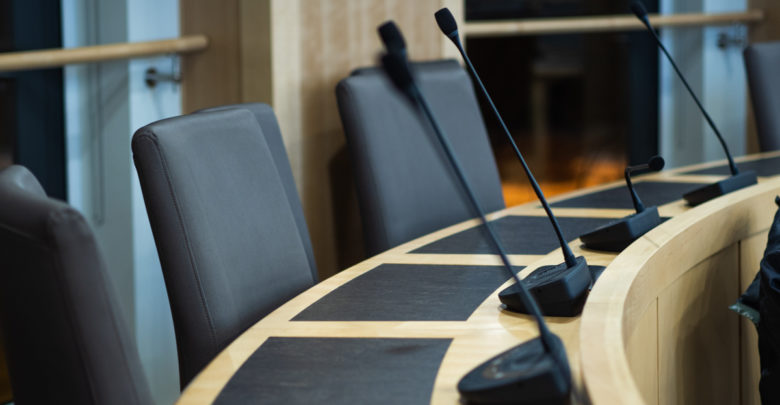Notes from Council: New Academic Integrity Policy draft presented
Council discussed the new Academic Integrity Policy draft and campus security.
 Helen Zhang
Helen Zhang“Notes from Council” is The Gateway’s ongoing series of recaps of noteworthy items from Students’ Council meetings.
During the September 26th Students’ Council meeting, Chris Hackett, acting director of Student Conduct and Accountability, presented on the University of Alberta’s new Academic Integrity Policy draft. The U of A Safety and Security Committee (UASSC) then presented on campus security.
Hackett came to council to seek feedback on the draft of the new Academic Integrity Policy. The draft includes new definitions for violations and sanctions, and processes that enable flexibility for responses at the faculty level. It also provides for non-disciplinary accountability actions in appropriate cases, instructions on required training for those administering decisions, and appeal procedures for students.
The Academic Integrity Policy is being drafted by a working group which includes Pedro Almeida, vice-president (academic). Council’s suggestions will inform revisions on the policy’s final draft, which the working group will submit for approval next term.
Policy changes from “crime and punishment model” to educational opportunity
Hackett referred to the Code of Student Behaviour as a “crime and punishment model” while presenting the new policy draft.
“We punish [academic misconduct] and then move on with significant consequences for people [without] necessarily fully addressing the problems that we’re presenting,” Hackett said.
The new policy allows the instructor to recommend an educational, non-adjudicative process for the student.
“They could say, ‘I [have] worked with the student. I believe that [they] didn’t really know what they were doing,'” Hackett said.
After consulting with the instructor, a faculty’s dean would decide if the student should undergo the non-disciplinary or disciplinary process.
In the non-disciplinary accountability process, the dean, along with a panel, would sit down with the student. The policy supports building educational resources to refer students to. In addition, the policy newly mandates that decision-makers on a panel must receive training.
“If the student doesn’t follow through on the expectation, then the case would go into the discipline process,” Hackett said. “If a severe sanction is warranted — suspension, expulsion — we would continue with that.”
“Even the mildest of sanctions can create significant limitations for students applying for medical school, law school, and all kinds of programs,” Hackett says
If students undergo the non-disciplinary processes without re-offending, academic dishonesty will be expunged from their record by the end of their program, Hackett said.
“One of the things that has driven me crazy at my job is even the mildest of sanctions can create significant limitations for students applying for medical school, law school, and all kinds of programs.”
Almeida said the new Academic Integrity Policy “outlines the difference between mild and other more severe types of cases.” If a faculty decision maker wants to impose a severe sanction, a student conduct officer has to approve it.
“[This] means that there’s a second set of eyes on it to ensure that any of these larger decisions … are done with carefulness to the process. And, carefulness to ensure that students aren’t over-punished,” Almeida said.
Vice-president (external) Chris Beasley questioned how the policy would define “end of program” for students leaving programs early to apply for medical or law school. Hackett said that measures are already in place to lift the probation when the student changes to another program.
The UASSC presents engagement plan on campus security
James Allen, co-chair of the U of A Safety and Security Committee (UASSC), presented on campus security.
To enhance safety on campus, UASSC is introducing a new campus security webpage with critical contact information, while enhancing staffing and outreach.
UASSC has also reallocated funding to hire permanent peace officers on campus. As well, they are making sure that security agents or third-party security providers patrol higher-risk locations. This is in response to a study conducted on staffing.
“Compared to our other post-secondary institutions across Canada, we were at the lower-end in terms of our staffing levels for the size of our campus and our population,” Allen said.
As well, Allen introduced elements of UASSC’s building action plan. The plan includes the installation of bike cages, improvements to infrastructure such as card-reader technology, and the reduction of facility hours of operation and points of entry.
He also mentioned removing access and reducing building hours to particular areas where vulnerable community members take shelter.
“As an institution, our commitment and our responsibility is to make sure that our students, faculty, and staff have a safe environment. Although some of these individuals may not be dangerous, substance abuse is prevalent. Therefore, it behooves us to limit access,” Allen said.
Michael Griffiths, vice-president (student life), said he is actively engaging with the university’s faculties to ensure they don’t “inhibit students’ access.”
Community Assistance Team providing supports for vulnerable community members on campus
The Community Assistance Team (CAT) was present and spoke on how they support vulnerable community members on campus. CAT is a partnership between U of A Protective Services (UAPS), the Bent Arrow Traditional Healing Society, and the Mustard Seed.
“Our main goal is to help vulnerable community members when they decide that they are ready and wanting resources,” Josh Dylan, an employee at the Mustard Seed, said. UAPS officer Tracy Giroux added that the team works “with people to get to the root of the problem.”
CAT also aids vulnerable students with a lack of financial supports and resources, “whether it’s [through] rent services [or a] safe house.”
Lastly, Allen is collaborating with Carrie Smith, vice–provost (equity, diversity, and inclusion), to hold listening circles in October. He said discussions will focus on a “transformative approach to safety, justice, and accountability.”




